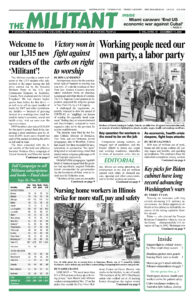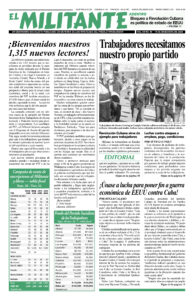An important victory for the constitutional right of freedom to worship was won Nov. 25 with the overturn of New York Gov. Andrew Cuomo’s discriminatory lockdown limits on churches, synagogues and other places of worship. The U.S. Supreme Court granted an injunction requested by religious groups in New York City by a 5-4 majority.
It challenged the regulations, ostensibly imposed to slow the spread of COVID-19, as “singl[ing] out houses of worship for especially harsh treatment,” finding they are unconstitutional and discriminatory compared to more expansive rules set by the governor for secular establishments.
The lawsuits were filed by the Roman Catholic Diocese of Brooklyn, New York, and two Orthodox Jewish synagogues, also in Brooklyn. Cuomo had issued, but then rescinded for now, restrictions in coronavirus “hot spots” designated as red and orange zones that limited indoor religious gatherings to 10 and 25 people respectively.
On behalf of the synagogues, Agud-ath Israel of America argued that the governor had specifically targeted Orthodox Jewish communities by gerrymandering the boundaries of these zones to include heavily Orthodox areas.
“Members of this court are not public health experts, and we should respect the judgment of those with special expertise,” the unsigned majority decision says. “But even in a pandemic, the Constitution cannot be put away and forgotten.”
“While the pandemic poses many grave challenges,” Justice Neil Gorsuch wrote in a separate concurring opinion, “there is no world in which the Constitution tolerates color-coded executive edicts that reopen liquor stores and bike shops but shutter churches, synagogues and mosques.”
“The only explanation for treating religious places differently,” Gorsuch said, “seems to be a judgment that what happens there just isn’t as ‘essential’ as what happens in secular spaces.”
“That is exactly the kind of discrimination the First Amendment forbids,” he concluded.
Earlier discriminatory rulings
The Supreme Court had ruled earlier this year against challenges to similar double standards set by the state governments in Nevada and California. This was before the recent appointment of Amy Coney Barrett by President Donald Trump.
Her appointment was decried by many liberals because she is Catholic. Democratic Sen. Dianne Feinstein had lectured Coney Barrett during her previous confirmation hearing to an appeals court judgeship, telling her “the dogma lives loudly within you.”
In a Nov. 12 talk to the Federalist Society, Justice Samuel Alito commented on the earlier Supreme Court ruling backing discriminatory limits on religious gatherings set by the governor of Nevada. Alito pointed to the danger of the rights to worship and free speech being demoted to “second class” rights. “A church, a synagogue or mosque, regardless of its size, may not admit more than 50 persons, but casinos and certain other favored facilities may admit 50% of their maximum occupancy,” he said, “and in the case of gigantic Las Vegas casinos, this means that thousands of patrons are allowed.”
Donna Lieberman, director of the New York Civil Liberties Union, and Daniel Mach, director of the American Civil Liberties Union’s Program of Freedom of Religion and Belief, attacked the ruling. “The freedom to worship is one of our most cherished fundamental rights,” Mach said, “but it does not include a license to harm others or endanger public health.”
Left unanswered, however, was the discriminatory difference in Cuomo’s restrictions on religious services as opposed to grocery stores, political meetings and other gathering locations. As Alito pointed out, “even a public health emergency does not absolve” the court of its “duty to defend the Constitution.”

